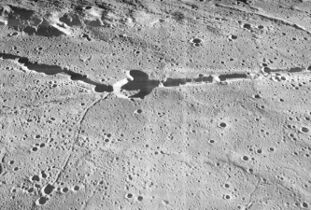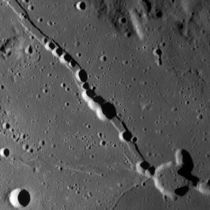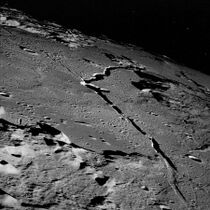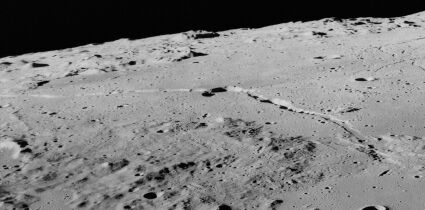Astronomy:Hyginus (crater)
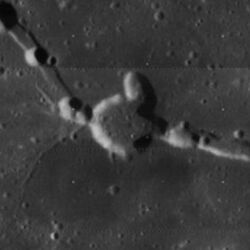 Lunar Orbiter 4 image | |
| Diameter | 11 km |
|---|---|
| Depth | 0.8 km |
| Colongitude | 354° at sunrise |
Hyginus is a lunar caldera located at the east end of the Sinus Medii. It was named after ancient Roman astronomer Gaius Julius Hyginus.[1] Its rim is split by a 220 kilometer-long rille, Rima Hyginus, that branches to the northwest and to the east-southeast. The crater is deeper than the rille, and lies at intersection of the rille's branches. Together, the crater and the rille form a prominent feature in an otherwise flat surface. Smaller craters along the length of the rille may have been caused by the collapse of an underlying structure.[citation needed]
Hyginus is one of the few craters on the Moon that was not created as a result of an impact, and is instead believed to be volcanic in origin. It lacks the raised outer rim that is typical with impact craters.[citation needed]
Hyginus was considered a possible landing site during the Apollo Program, because it was thought to be a site of potentially active volcanism.[2] The landing point would have been northwest of the crater, within a few kilometers of the main crater rim and the rille to the west. Major objectives would have included examining and sampling the Cayley Formation and dark overlying rocks, the crater rim and floor, and other possible volcanic features in the area.[3]
It was near Hyginus that in 1878 Hermann Klein claimed to have discovered a new crater.[4]
Views
Lunar Orbiter 3 image
LRO image of Hyginus (lower right) and part of Rima Hyginus
Oblique view from Apollo 10
Oblique view from Apollo 17
Satellite craters
By convention these features are identified on lunar maps by placing the letter on the side of the crater midpoint that is closest to Hyginus.
| Hyginus | Latitude | Longitude | Diameter |
|---|---|---|---|
| A | 6.3° N | 5.7° E | 8 km |
| B | 7.6° N | 5.1° E | 6 km |
| C | 7.7° N | 8.3° E | 5 km |
| D | 11.4° N | 4.3° E | 5 km |
| E | 8.7° N | 8.5° E | 4 km |
| F | 8.0° N | 8.6° E | 4 km |
| G | 11.0° N | 6.0° E | 4 km |
| H | 6.0° N | 7.0° E | 4 km |
| N | 10.5° N | 7.4° E | 11 km |
| S | 6.4° N | 8.0° E | 29 km |
| W | 9.7° N | 7.7° E | 22 km |
| Z | 8.0° N | 9.5° E | 28 km |
References
- ↑ "Hyginus (crater)". Gazetteer of Planetary Nomenclature. USGS Astrogeology Research Program.
- ↑ To a Rocky Moon: A Geologist's History of Lunar Exploration. Don E. Wilhelms, University of Arizona Press (1993), Chapter 10. ISBN:978-0816510658
- ↑ El-Baz, Farouk, 1968. Geologoic Characteristics of the Nine Lunar Landing Mission Sites Recommended by the Group for Lunar Exploration Planing. Bellcomm, Inc. TR-68-340-1.
- ↑ Klein, Hermann (1878). "1878AReg...16..265K Page 265". Astronomical Register 16: 265. Bibcode: 1878AReg...16..265K. https://articles.adsabs.harvard.edu//full/1878AReg...16..265K/0000282.000.html. Retrieved 2022-07-21.
- C.G. Wood (2006). "The Moon's Mystery Rilles". Sky & Telescope 112 (3): 54–55.
- Andersson, L. E.; Whitaker, E. A. (1982). NASA Catalogue of Lunar Nomenclature. NASA RP-1097.
- Bussey, B.; Spudis, P. (2004). The Clementine Atlas of the Moon. New York: Cambridge University Press. ISBN 978-0-521-81528-4.
- Cocks, Elijah E.; Cocks, Josiah C. (1995). Who's Who on the Moon: A Biographical Dictionary of Lunar Nomenclature. Tudor Publishers. ISBN 978-0-936389-27-1. https://archive.org/details/isbn_9780936389271.
- McDowell, Jonathan (July 15, 2007). "Lunar Nomenclature". Jonathan's Space Report. http://host.planet4589.org/astro/lunar/.
- Menzel, D. H.; Minnaert, M.; Levin, B.; Dollfus, A.; Bell, B. (1971). "Report on Lunar Nomenclature by the Working Group of Commission 17 of the IAU". Space Science Reviews 12 (2): 136–186. doi:10.1007/BF00171763. Bibcode: 1971SSRv...12..136M.
- Moore, Patrick (2001). On the Moon. Sterling Publishing Co.. ISBN 978-0-304-35469-6. https://archive.org/details/patrickmooreonmo00patr.
- Price, Fred W. (1988). The Moon Observer's Handbook. Cambridge University Press. ISBN 978-0-521-33500-3.
- Rükl, Antonín (1990). Atlas of the Moon. Kalmbach Books. ISBN 978-0-913135-17-4.
- Webb, Rev. T. W. (1962). Celestial Objects for Common Telescopes (6th revised ed.). Dover. ISBN 978-0-486-20917-3. https://archive.org/details/celestialobjects00webb.
- Whitaker, Ewen A. (1999). Mapping and Naming the Moon. Cambridge University Press. ISBN 978-0-521-62248-6.
- Wlasuk, Peter T. (2000). Observing the Moon. Springer. ISBN 978-1-85233-193-1.
External links
- Hyginus at The Moon Wiki
- Wood, Chuck (November 13, 2007). "Numbering the Marvels". Lunar Photo of the Day. http://www.lpod.org/?m=20071113.
- Wood, Chuck (November 15, 2007). "Colorful Interpretation". Lunar Photo of the Day. http://www.lpod.org/?m=20071115.
- Wood, Chuck (March 20, 2010). "Another Ina?". Lunar Photo of the Day. http://lpod.wikispaces.com/March+20%2C+2010.
 |
